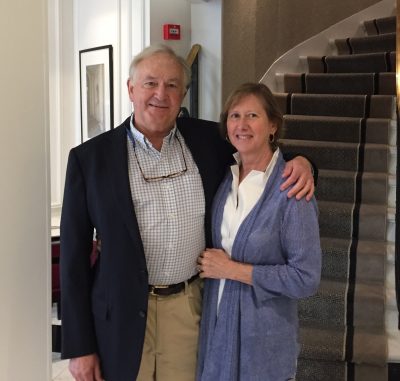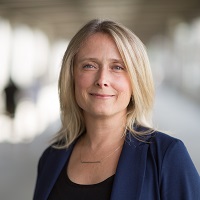$1 million gift furthers landmark study focused on reducing breast cancer disparities, barriers to high-quality care
October 5, 2021

Rich Preyer and Marilyn Jacobs Preyer
Rich Preyer and Marilyn Jacobs Preyer (‘82) of Hillsborough, North Carolina, have donated $1 million to support the latest phase of UNC Lineberger Comprehensive Cancer Center’s Carolina Breast Cancer Study, which is investigating how the causes, treatments and long-term outcomes of breast cancer differ between Black women and white women. This gift builds on the couple’s longstanding commitment to advancing breast cancer research and breaking down barriers to high quality health care for all.
Researchers from UNC Lineberger and the UNC Gillings School of Global Public Health launched the landmark Carolina Breast Cancer Study in 1993 to bring together their collective expertise in epidemiology and molecular biology to identify a wider range of breast cancer risk factors and to better understand how these risk factors contribute to disparities in breast cancer among Black women and white women.
As a breast cancer survivor, Jacobs Preyer said she always felt fortunate to have access to high-quality health care, and she wants to ensure everyone has the same opportunity.
“It always stayed with me how fortunate I was to have this access,” she said. “The translational aspect of this research is very powerful to me, and to see the partnership between the university and the community, town and state, is exciting; we can move the needle and have an impact on society.”
The Carolina Breast Cancer Study is internationally renowned for its innovative research exploring the biological and social determinants of health — from pathology, molecular markers and genetics on the cellular level to how people access health care, financial toxicities and quality of life following diagnosis.
The study’s principal investigator is Melissa Troester, PhD, professor of epidemiology at UNC Gillings. She is also an alum, having earned a Master of Public Health in epidemiology in 2006 and Doctor of Philosophy in environmental sciences and engineering in 2001 from the School.

Dr. Melissa Troester
Troester will lead the research team in Phase 4 of the study, which will use high-end computing to incorporate and analyze image data from histopathology and mammograms, enabling scientists to develop a more robust model of disparities and breast cancer outcomes. The researchers also aim to double the number of young women and Black women participating in the research
“These statewide partnerships will help us recruit and contact women and collect more data,” said Troester. “We have unique strengths at UNC in data science, and we’re going to leverage this for a more comprehensive, multidimensional understanding of breast cancer and health equity.”
The private funds will help researchers expand the study to include more participants and to lay the foundation to pursue external funding sources as the study progresses.
“Private philanthropy helps us get things going and gives us a leg up in securing additional scientific grant support. We couldn’t do this work without private partners,” Troester added.
“We are so grateful for philanthropic partners like Marilyn and Rich,” said Shelley Earp, MD, UNC Lineberger director and Lineberger Professor of Cancer Research. “They recognize the importance of our work to explore and address the disparities in breast cancer care, treatment and survival outcomes. They are passionate about health inequities and are investing in us to analyze the problems and implement solutions.”
“I’m so grateful for the care I’ve received at UNC,” Jacobs Preyer shared. “The idea that we have a comprehensive cancer center right here in our backyard, we have to take advantage of that world-class clinical and research asset.”
This gift from Rich Preyer and Marilyn Jacobs Preyer counts toward the Campaign For Carolina, UNC-Chapel Hill’s most ambitious fundraising campaign in history, which was launched in October 2017 with a goal to raise $4.25 billion by December 2022.
The Carolina Breast Cancer Study is funded in part by the University Cancer Research Fund, the National Cancer Institute‘s Specialized Program of Research Excellence (SPORE) in breast cancer and Susan G. Komen.
Contact the UNC Gillings School of Global Public Health communications team at sphcomm@unc.edu.
